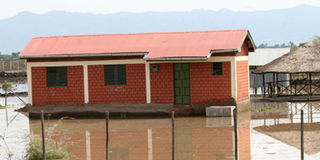Ignoring arts subjects a sign of ignorance

A house surrounded by water in Ahero following heavy rains that pounded the area recently. Environmental geographers advance the issue of climate change and its adverse effects in the coming generations. PHOTO/JACOB OWITI
What you need to know:
- I have seen engineers and mathematicians who are unemployed or are doing jobs that require people who studied the arts.
- One might even wonder what scientists have contributed to national development in Kenya.
While addressing teachers and students at the Kenya Technical Training College on Wednesday last week, the Deputy President William Ruto is reported to have said that subjects like geography, history, sociology and anthropology should not be taught in universities and that students should be taught science and technical courses which will make them employable.
To teach or not teach the arts is an issue that needs serious thinking. Art subjects have a lot to offer to human development.
First, there is an arrogance and elitism associated with the study of science which is often misplaced. Throughout my teaching career, I have seen science students who lack jobs or are unhappy with the jobs they do.
Secondly, I have seen engineers and mathematicians who are unemployed or are doing jobs that require people who studied the arts. Thirdly, one might even wonder what scientists have contributed to national development in Kenya. We import all our technologies, and our buildings and roads are constructed by Chinese engineers.
SCIENTISTS NEED TO BE MADE MORE RELEVANT
I think the Deputy President could help Kenya by actively making scientists more relevant to Kenya than they are.
The reason there is unemployment in Kenya is we now import almost all the things we consume, thanks to the structural adjustment programmes of the late 1980s and 1990s which liberalised trade.
A historical geographer will teach that at some point in time, Thika town was known as the Birmingham of Kenya because of the industries that were present. A medical geographer will help doctors by mapping disease in the country to show which areas are prone to specific diseases and what kind of medicines should be supplied to different regions.
A social geographer will map out human relationships and write about interpersonal relationships.
A political geographer, will unearth the dynamics of everyday politics as well as people’s voting behaviour. A biogeographer will champion the need to protect biodiversity, including rivers, plants, lakes and oceans.
Environmental geographers advance the issue of climate change and its adverse effects in the coming generations.
Over 30 years ago, my two professors, Prof Celia Nyamweru and Prof Michael Darkoh, presented works on climate change and the vulnerability of our earth due to earth movements. Prof Celia Nyamweru researched on rifts and volcanoes in East Africa.
She predicted some of the problems we are now experiencing in the Rift Valley. Prof Darkoh gave a public lecture on man and desertification. Prof Ominde, a population geographer, sensitised Kenya on the issues and dangers of rapid population growth.
Medical geographers like Isaac Sindiga devoted a lot of their time on the study of diseases like Malaria and HIV Aids. Kamonji Wachira, a biogeographer, launched a biodiversity preservation project in the arboretum at Kenyatta University.
Urban geographers like Richard Obudho have made significant contribution to our understanding of urban dynamics in the country. Younger geographers like Francis Wegulo, Agnes Musyoki, Joy Obando, Philomena Muiruri and Mary Kinyanjui are making significant contributions in their discipline speciality.
IGNORANCE
Saying that geography is not relevant is a matter of ignorance. It also shows the failure of our leaders to appreciate what local students and scholars are doing in their respective disciplines.
In the late 1990s and early 2000s, we introduced the entrepreneurial turn in our education. We turned our schools into firms and corporations and encouraged everyone to become an entrepreneur. We are now reaping the effects in increased corruption, greed and selfishness because we ignored to teach ethics and values.
Now we are introducing a technical turn to our education where students will only learn how to fix things. We need balance in our education system. The arts are necessary and important just as science. Above all, let us address the question of how we can reduce our import bills and create jobs.
***
Mary Njeri Kinyanjui, PhD, is a research fellow at the Institute of Development Studies, University of Nairobi. She is the author of Coffee Time, Vyama Institutions of Hope, Women and the informal economy in urban Africa and Africa Metropolis and the Utu-Ubuntu business model.




